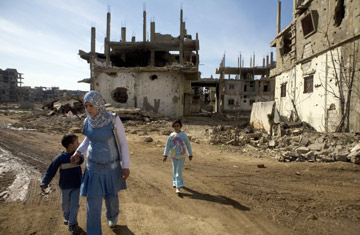
SHATTERED LIVES: Families live among ruins, with little hope of ever leaving
(2 of 2)
Residents accuse the army of looting and destroying their homes in revenge for the 160 Lebanese soldiers who died in the battle. "The war with Israel was much easier than this," says Mohammed Ali Hamid, a 76-year-old veteran from the Popular Front for the Liberation of Palestine, whose home in Nahr al-Bared was hit by some 20 rockets and artillery shells last summer. Other wild-eyed residents claim that the bombardment of the camp was part of a secret plan to clear the space for an American base. The children at one kindergarten act out the searing memories of being forced from their refugee camp during the fighting by shouting at each other. "Where is your ID?" one demands. "You don't have permission!" another says. They form little checkpoints in the playground. In class, they draw pictures of burned houses, dead bodies and soldiers locked up in jail.
The Fire Next Time
Ein el Hilweh is the largest Palestinian camp in Lebanon, with 70,000 inhabitants. Built just outside the southern city of Sidon, it is surrounded by walls and watchtowers and looks like a postapocalyptic penal colony from a Mad Max movie — albeit one decorated with posters of Saddam Hussein, Osama Bin Laden and Yasser Arafat. The main Palestinian political parties Hamas and Fatah have carved the camp up like gang turf, leaving a no-man's-land as a haven for dangerous jihadist groups.
Chehadeh Jawhar, the Palestinian military commander of Jund al-Sham (Soldiers of Greater Syria), trained al-Qaeda militants in Iraq before moving to Ein el Hilweh. When Jawhar spoke with TIME in March last year, he said that the jihadist factions in the camp were supported by intelligence agencies from the countries that have turned Lebanon into a battlefield. "Anyone who has a project in Lebanon can use the Palestinians to create chaos," he said. Four months later, Jawhar died in a street fight.
Munir Makdah, the commander of Fatah militias in Lebanon and the head of security in Ein el Hilweh, keeps busy trying to survive the regular jihadist attempts on his life — there were five last year alone. Makdah is all that stands between Ein el Hilweh and chaos. When he's not out on patrol he serves as a patron of social programs for children. One of his favorites is the troupe that performs dabka, an Arab circle dance, at festivals around the world. The other is a school for Fatah fighters.
As many as 200 boys and girls are enrolled in Makdah's fighting camp — a tin hangar with an asphalt parade ground, where they learn the basics of hand-to-hand combat, firearms and Palestinian national ideology. "We teach what they don't learn at United Nations schools," says one local Palestinian official. On one recent day, some 50 schoolboy cadets gathered in Makdah's office after attending a demonstration against Israeli attacks on Gaza. He offered them a lesson they are unlikely to forget. "In the past, Jews used to kill us, and no one defended us," he explained. "Today, if the Jews kill us, we kill them." Later, Makdah — who was born in Lebanon and has been a fighter since the age of 12 — vowed that Palestinian leaders negotiating with Israel would never trade away the right of return. "No peace agreement can survive if there is one refugee outside the homeland," he said. The Palestinians' long, dismal wait seems doomed to continue.
